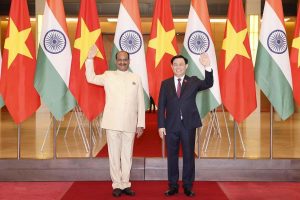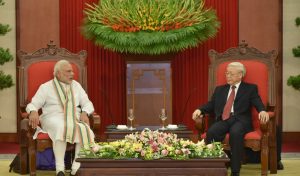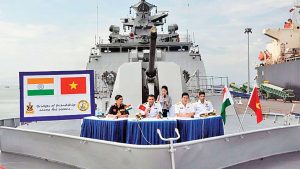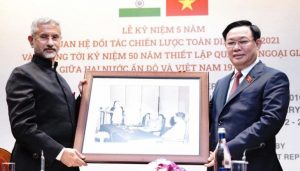
India-Vietnam ties are literally flying high, with the launch of four new flights, symbolising higher trajectory in this multi-faceted partnership which celebrates its golden jubilee this year.
Lok Sabha Speaker Om Birla has inaugurated four new flights between India and Vietnam between Hanoi, Ho Chi Minh City and Mumbai as well as between southern resort island of Phu Quoc and New Delhi and Mumbai. Mr Birla, who was recently on a visit to Vietnam, underlined that the new flights will help boost the economies of both the countries and increase business and tourism opportunities. He also met the Chairman of Vietnam’s National Assembly Vuong Dinh Hue, who had visited India only a few months ago.
The landmark visit of Vuong Dinh Hue to New Delhi in December 2021 propelled Delhi-Hanoi ties to a higher trajectory as India rolled out the red carpet for him. PM Modi, Vice-President M. Venkaiah Naidu and External Affairs Minister S. Jaishankar were among those who met Vietnam’s Speaker and conveyed their commitment to upscale bilateral days in months to come. “While the world continues to undergo constant changes, the Viet Nam-India ties have remained the same, loyal and sincere,” said Mr Hue at a ceremony held to mark the 5th anniversary of the establishment of strategic partnership between India and Vietnam.
Act East

Marking the 50th anniversary of the establishment of diplomatic relations between India and Vietnam, India’s Prime Minister Narendra Modi held a telephonic conversation with Mr. Nguyen Phu Trong, General Secretary of the Communist Party of Vietnam, on April 15. In this conversation, PM Modi underscored Vietnam’s importance as “an important pillar of India’s Act East Policy and Indo-Pacific Vision,” and pushed for expanding the canvas of the India-Vietnam partnership.
Highlighting the centuries-old historical and civilization links between the two countries, PM Modi expressed his happiness at India’s involvement in the restoration of Cham monuments in Vietnam. Batting for enhanced economic ties, PM Modi requested the Vietnamese leader for greater facilitation of market access for India’s pharma and agri-products in Vietnam. Going forward, the two leaders agreed to enhance defence partnership between the two countries, with an eye on countering China’s growing assertiveness in the region. They also exchanged views on regional and global issues of shared interest, including the ongoing crisis in Ukraine and the situation in South China Sea.
Expanding Partnership
The wide-ranging conversation between the leaders has set the tone for the 50th anniversary celebrations and telescoped the blossoming of the India-Vietnam relations over the last five decades. The mutually empowering ties acquired a strong momentum after the forging of India-Vietnam Comprehensive Strategic Partnership, during PM Modi’s landmark visit to Vietnam in 2016. Since then, the relations have been steadily scaling new frontiers in nearly all areas, including diplomatic-political, economic and cultural. In this regard, the first-ever virtual summit between the prime ministers of India and Vietnam in December 2020 unveiled the “Joint Vision for Peace, Prosperity and People,” which envisages intensification of bilateral ties across the spectrum.
Economic Upswing
In sync with growing strategic ties, economic relations are also on an ascending curve. From US$ 200 million in 2000, bilateral trade between India and Vietnam is now estimated to be over reached US$ 13 billion. In FY 2020-21, for India, Vietnam was the 15th largest trading partner globally and the 4th largest within ASEAN, following Singapore, Indonesia and Malaysia. For Vietnam, on the other hand, India was the 10th largest trading partner globally. Indian investments in Vietnam have grown to around $2 billion, including investments routed through third countries.
Economic ties are accompanied by expanding development partnership, which includes collaboration in training, capacity building and human resource development. India has also been providing assistance to Vietnam within the ASEAN framework. Under the Mekong Ganga Cooperation (MGC) framework, India has been taking up Quick Impact Projects (QIPs), each valued at US$ 50,000, in different provinces of Vietnam for development of community infrastructure.
South China Sea & Maritime Security

With China’s growing assertiveness in South China Sea as a backdrop, India-Vietnam partnership is becoming increasingly important in maintaining regional peace and safeguarding freedom of navigation. In this regard, China’s military drills in the South China Sea in March in an area between its southern province of Hainan and Vietnam, which was fiercely opposed by Hanoi, underscores the imperative for enhanced India-Vietnam and international collaboration in combating Beijing’s moves to change the status quo in the contested territory. As an emerging global player and a maritime power, India has a special responsibility to promote a rules-based maritime order, in conformity with UNCLOS. In this context, India should encourage the ASEAN-China negotiations for the expeditious conclusion of a binding code of conduct in in South China Sea, in accordance with international law, especially UNCLOS, without prejudice to the rights and interests of all nations including those not party to these negotiations. Looking ahead, India needs to play a bigger role in countering any attempt to violate freedom of navigation in South China Sea, especially in the current global situation wherein some fear that the Russian invasion of Ukraine could lead to a dilution of global focus on China’s activities in South China Sea.
Global Coordination
The two strategic partners have also scaled up their coordination in the international arena, which is reflected in their enhanced collaboration in ASEAN, East Asia Summit and the United Nations. India and Vietnam supported each other’s interests and priorities during their stint as non-permanent members of the UN Security Council. Reforming global governance institutions, including the UN, reformed multilateralism and peacekeeping figure prominently in India-Vietnam coordination in UN.

Looking ahead, India-Vietnam relations will be driven by shared interests and synergies, underpinned by the three Cs: Commerce, Culture and Connectivity. Going by current trends, the next fifty years will take India-Vietnam ties to new trajectory as the two countries expand bilateral ties to include new technologies, innovation, and digitization, and sustainable and inclusive development.
In a speech at the celebration of 5th Anniversary of India-Vietnam Comprehensive Strategic Partnership in New Delhi last year, India’s External Affairs Minister S. Jaishankar positioned bilateral ties as a stabilising factor in a changing world. “At a time of global uncertainty and post-Covid economic recovery, the India-Vietnam partnership will be a significant stabilizing factor in the Indo-Pacific. Keeping our national ambitions and global responsibilities in mind, we must forge ahead,” he said.
(Manish Chand is Founder-CEO of India Writes Network, India and the World magazine and Centre for Global India Insights, a think tank focused on global affairs.)
Author Profile

- Manish Chand is Founder and Editor-in-Chief of India Writes Network (www.indiawrites.org) and India and World, a pioneering magazine focused on international affairs. He is CEO, Centre for Global India Insights, an India-based think tank focused on global affairs.
Latest entries
 India and the WorldFebruary 27, 2026Modi visit: India-Israel partnership enters a new era
India and the WorldFebruary 27, 2026Modi visit: India-Israel partnership enters a new era India and the WorldFebruary 24, 2026Unravelling Modi’s Israel journey: What to expect
India and the WorldFebruary 24, 2026Unravelling Modi’s Israel journey: What to expect India and the WorldFebruary 17, 2026South-by-South: Focus on people-centric solutions at India AI summit
India and the WorldFebruary 17, 2026South-by-South: Focus on people-centric solutions at India AI summit India and the WorldFebruary 7, 2026Modi hails interim India-US trade deal, Goyal says no concessions made on agriculture
India and the WorldFebruary 7, 2026Modi hails interim India-US trade deal, Goyal says no concessions made on agriculture







